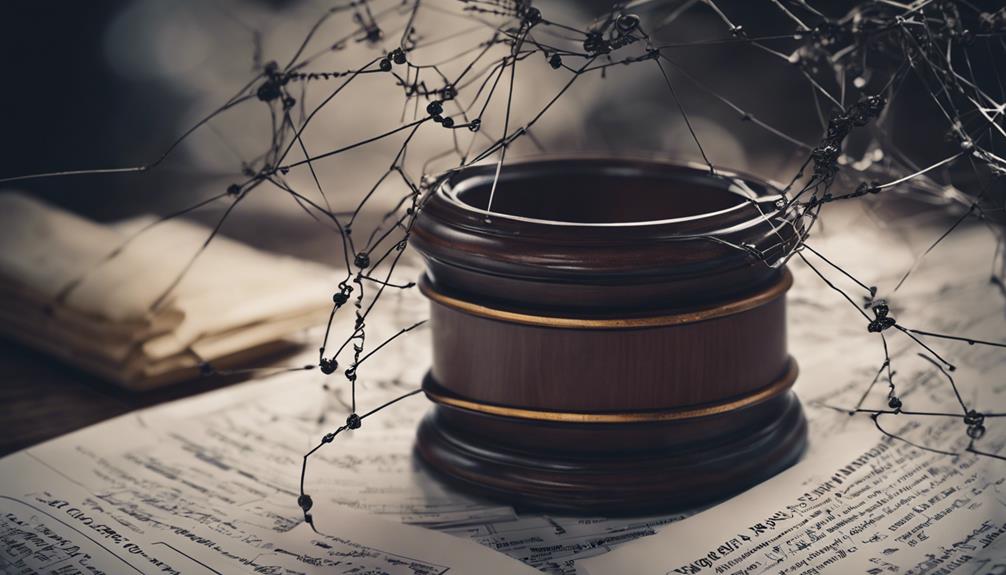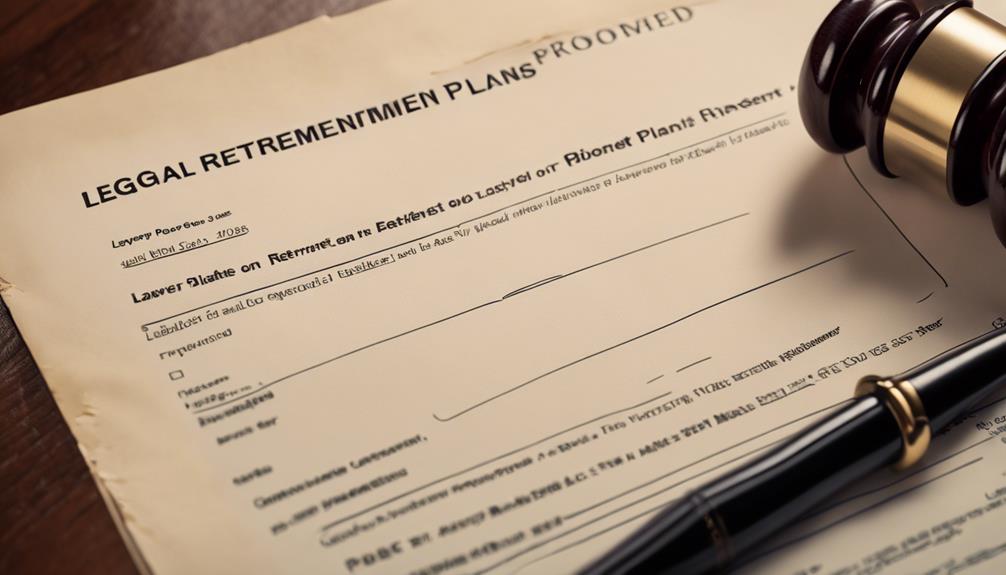Retirement plans can bypass probate by designating proper beneficiaries, which allows for a seamless transfer of assets. Failing to name beneficiaries can result in delays and added expenses. Individual beneficiaries can help lessen the burden of estate taxes and legal disputes. It is crucial to seek tax advice and keep beneficiary information up to date for efficient wealth transfer. Estate planning attorneys specialize in distributing assets and minimizing tax consequences. Trusts such as Revocable Living Trusts provide protection for retirement assets against creditors. Regularly updating beneficiary designations is essential to ensure assets are transferred according to one’s wishes. Proper estate planning can protect both assets and beneficiaries. Understanding how probate affects retirement plans is essential for effective wealth management.
Key Takeaways
- Retirement plans with designated beneficiaries bypass probate proceedings.
- Lack of valid beneficiaries can lead retirement plans to go through probate.
- Accurate beneficiary designations streamline the inheritance process.
- Ensure assets are distributed according to your wishes.
- Keep beneficiary designations updated to avoid probate involvement.
Retirement Account Beneficiary Designation

Having a proper beneficiary designation on retirement accounts is essential for bypassing probate proceedings. When individuals designate a beneficiary for their retirement plans, they guarantee that the assets in those accounts can smoothly transfer to the chosen recipient without the need for probate involvement.
Failure to name a beneficiary can result in the retirement account assets being subject to probate, causing delays and additional expenses for the beneficiaries. To avoid probate for retirement plans, it is important to keep beneficiary information updated regularly and make sure that a valid designated beneficiary is in place.
Valid beneficiaries for retirement accounts can include individuals, trusts, or charities. By designating a beneficiary, individuals can effectively incorporate their retirement assets into their overall estate plan, facilitating the transfer of these assets upon their passing. This simple step can help streamline the distribution process and provide peace of mind knowing that their retirement savings will be handled according to their wishes.
Avoiding Probate With Designated Beneficiaries

Properly designating beneficiaries on retirement accounts is a fundamental strategy for avoiding probate proceedings and guaranteeing the seamless transfer of assets to chosen recipients. By establishing beneficiary designations on your retirement accounts, you can directly dictate who will receive your retirement assets upon your passing. This method allows for the assets to bypass probate, which can be a lengthy and costly process.
When a valid beneficiary is named, the estate named in the account gains immediate access to the funds, avoiding delays in distribution. It is essential to keep your beneficiary designations up to date, especially after significant life events such as marriage, divorce, or the birth of children. By proactively managing your beneficiary designations, you can ensure that your retirement assets are transferred according to your wishes without being tied up in probate.
Proper planning in this area can provide peace of mind for you and your loved ones while streamlining the transfer of wealth.
Consequences of Estate Named as Beneficiary

When an estate is named as the beneficiary of a retirement account, estate taxes and potential legal challenges can impact the distribution of assets. Creditors may also have claims on the retirement funds if the estate is designated, potentially delaying distribution to beneficiaries.
To avoid these consequences, consider designating individual beneficiaries to streamline the transfer of retirement assets and bypass probate involvement.
Estate Taxes Impact
Naming an estate as the beneficiary of a retirement account can result in potential estate tax consequences and probate involvement. Assets passing through probate due to an estate designation may trigger estate taxes at both state and federal levels. Additionally, creditors may have the opportunity to make claims on these assets before beneficiaries receive their share.
Proper beneficiary designation is important to sidestep probate and mitigate estate tax implications. By designating individuals directly as beneficiaries instead of the estate itself, you can potentially reduce the estate tax burden and avoid probate delays.
Understanding the impact of estate taxes and probate involvement when naming beneficiaries is essential for effective retirement planning and wealth distribution.
Potential Legal Challenges
In designating an estate as the beneficiary of a retirement plan, one must consider the potential legal challenges that may arise. These include delays in distribution, potential creditor claims, and estate tax implications.
By naming the estate as the beneficiary, the retirement assets become subject to the probate process. This can lead to prolonged delays before beneficiaries receive their share of the funds.
Additionally, creditors may file claims against the estate. This would require debts to be settled before the distribution of the retirement plan proceeds. This not only complicates the process but also exposes the assets to additional taxes and expenses during probate.
To avoid such legal challenges, individuals should carefully weigh the consequences of naming their estate as the beneficiary of their retirement plan. They should consider alternative beneficiary designations to streamline the distribution process.
Tax Implications and Probate Process

The intersection of tax implications and the probate process concerning retirement plans is a critical aspect that should be taken into account for efficient asset distribution and estate planning. When retirement plans are involved in the probate process, it can lead to delays in asset distribution and incurring additional costs. Additionally, the probate process can trigger tax implications for both the estate and the beneficiaries of the retirement plans. Ensuring proper beneficiary designation is essential to prevent retirement plans from going through probate and simplifying the inheritance process.
| Tax Implications | Probate Process |
|---|---|
| Can trigger estate taxes | May lead to delays |
| Impact beneficiaries | Potential costs |
| Vary based on jurisdiction | Additional paperwork |
| Consider seeking tax advice | Requires court supervision |
Importance of Estate Planning Attorney

Estate planning attorneys play an essential role in organizing and structuring retirement plans to guarantee seamless distribution of assets upon death. They collaborate with clients to craft personalized strategies that align with their long-term financial goals and ensure their loved ones are cared for. By addressing key aspects such as wills, trusts, and tax implications, these attorneys help mitigate potential conflicts and preserve generational wealth. Through these measures, retirement planning importance explained comes into focus as individuals gain peace of mind knowing their legacy is protected and their wishes will be honored.
Their legal expertise helps in maneuvering through complex regulations and minimizing tax implications, ultimately safeguarding the financial well-being of beneficiaries.
Attorney's Role in Planning
With meticulous attention to detail, estate planning attorneys play a pivotal role in guiding individuals towards creating robust strategies for managing their assets and affairs posthumously. These legal professionals provide valuable expertise in various aspects of estate planning, including:
- Crafting wills, trusts, and other essential documents to guarantee proper asset distribution.
- Minimizing estate taxes through strategic planning.
- Avoiding the probate process to streamline asset distribution.
- Safeguarding assets from creditors and ensuring they are protected for intended beneficiaries.
Legal Expertise Benefits
Given the intricate legal considerations surrounding retirement plans and probate, the expertise of estate planning attorneys proves invaluable in ensuring seamless asset distribution and maximizing benefits for intended beneficiaries. These professionals assist in setting up proper beneficiary designations, helping to avoid retirement plans from going through probate.
By working with estate planning attorneys, individuals can navigate the complex tax implications involved in transferring assets, ultimately leading to a more efficient and beneficial distribution process. Additionally, these legal experts provide essential guidance on updating beneficiary information, which is vital for preventing probate involvement and ensuring that retirement assets are transferred smoothly to the intended beneficiaries.
Common Beneficiary-Selection Mistakes

Mistakes in selecting beneficiaries for retirement plans can have significant implications, potentially leading to probate proceedings. When it comes to beneficiary selection, there are several common errors to avoid:
- Not naming a spouse in community property states, which may trigger probate for retirement accounts.
- Naming a trust or estate as a beneficiary, resulting in retirement plans going through probate.
- Designating a minor as a beneficiary of a retirement account, which can complicate matters and potentially lead to probate.
- Forgetting to name alternate beneficiaries on retirement accounts, potentially resulting in probate proceedings.
It's crucial to carefully consider these factors to safeguard your retirement assets are protected and distributed according to your wishes. Additionally, being aware of estate tax implications and seeking professional guidance can help prevent these common beneficiary-selection mistakes.
Ways to Protect Retirement Assets

Protecting retirement assets is essential for ensuring a smooth transfer to beneficiaries. Important strategies include:
- Setting up proper beneficiary designations
- Considering trusts for added asset protection
- Incorporating estate planning techniques
Beneficiary Designations Importance
Guaranteeing proper beneficiary designations on retirement accounts is crucial for safeguarding assets and facilitating a seamless transfer without probate involvement. To protect retirement assets effectively, consider the following:
- Designate Primary and Alternate Beneficiaries: Naming primary and alternate beneficiaries ensures a smooth transfer of retirement assets.
- Review and Update Regularly: Errors in beneficiary designation can lead to probate involvement for retirement plans. Regularly reviewing and updating beneficiary information can help avoid probate.
- Avoid Naming Minors as Beneficiaries: Naming minor beneficiaries can complicate the transfer process. Consider setting up a trust or custodial account for minor beneficiaries instead.
- Bypass Probate with Correct Designations: Proper beneficiary designations can help retirement assets bypass probate, ensuring a more efficient transfer process.
Trusts for Asset Protection
Beneficiary designations play a critical role in safeguarding retirement assets, but trusts offer additional layers of protection and control for ensuring efficient asset distribution and minimizing probate involvement. Establishing trusts for retirement accounts can help avoid probate, customize the distribution process, and provide asset protection. Here is a comparison between revocable living trusts and irrevocable trusts for safeguarding retirement assets:
| Trust Type | Benefits |
|---|---|
| Revocable Living Trusts | – Avoid probate for retirement accounts |
| – Guarantee efficient asset transfer to beneficiaries | |
| Irrevocable Trusts | – Shield retirement assets from creditors |
| – Provide long-term protection for beneficiaries |
Estate Planning Strategies
An essential aspect of safeguarding retirement assets involves implementing strategic estate planning measures to secure efficient asset distribution and minimize probate complexities. Proper beneficiary designation on retirement plans can help bypass probate and guarantee a smooth transfer of assets.
However, naming a trust or estate as a beneficiary may lead to probate involvement for retirement accounts. If minors are designated as beneficiaries, a custodian may be required to manage the assets until they reach adulthood to avoid probate.
Regularly reviewing and updating beneficiary designations is vital to prevent retirement plans from going through probate. Working with experienced attorneys in estate planning can provide guidance on strategies to protect retirement assets from probate.
Understanding Probate for Retirement Plans

Understanding the probate process for retirement plans is essential for ensuring efficient asset distribution. Typically, retirement accounts such as IRAs and 401(k)s do not go through probate if they have designated beneficiaries. By naming a beneficiary, the assets in these accounts can bypass probate court, ensuring a smoother transfer to the intended recipient.
However, if a retirement plan lacks valid beneficiaries, it may be subject to probate, causing delays in distributing the funds to heirs. To avoid probate for retirement plans, it is vital to keep beneficiary designations up to date and accurate.
Properly maintained beneficiary designations on retirement accounts can streamline the inheritance process, minimizing legal complications and ensuring that the assets are distributed according to the account owner's wishes. By understanding the importance of beneficiary designations, individuals can take proactive steps to safeguard their retirement assets and facilitate a seamless transfer of wealth to their chosen beneficiaries.
Key Considerations for Estate Plans

When crafting estate plans, thoughtful consideration of key elements is vital for effective wealth distribution and asset management. To guarantee your estate avoids probate and retirement accounts are properly managed, the following considerations are imperative:
- Estate Must Have Proper Beneficiary Designations: Ensuring that your retirement accounts have designated beneficiaries can help prevent probate and ensure a smooth transfer of assets.
- Regularly Review Your Beneficiary Designations: It is important to review and update your beneficiary designations regularly to accurately reflect any life changes or new wishes.
- Avoid Probate by Naming Individual Beneficiaries: Naming specific individuals as beneficiaries rather than a trust or estate can help prevent probate involvement.
- Understand Legal Restrictions for Minors: High-value assets from retirement accounts cannot be directly received by minors due to legal constraints, necessitating careful planning for their inheritance.
Smooth Transfer of Retirement Assets

To guarantee a seamless transfer of retirement assets, it is vital to have proper beneficiary designations in place for your retirement plans. By naming primary and alternate beneficiaries correctly, you can secure that your retirement accounts bypass probate and smoothly transfer to your chosen recipients.
Without designated beneficiaries, there is a risk of your retirement plans becoming subject to probate proceedings. The direct transfer of assets to beneficiaries, facilitated by up-to-date beneficiary designations, can help avoid delays and complications that probate may entail.
Regularly reviewing and updating your beneficiary designations is essential to keep pace with any life changes or new circumstances, ensuring that your retirement accounts are aligned with your intended distribution wishes. By taking proactive steps to maintain accurate beneficiary information, you can help secure a straightforward handover of your retirement assets to your loved ones while avoiding the complexities of probate. Additionally, updating your retirement plan regularly allows you to account for major events such as marriage, divorce, the birth of a child, or the passing of a loved one, which may impact your distribution preferences. This practice not only reflects your current wishes but also minimizes potential disputes among heirs or unintended beneficiaries. By staying vigilant and making revisions as needed, you can ensure your retirement plan remains a true reflection of your evolving priorities and goals.
Frequently Asked Questions
Do Retirement Accounts With Beneficiaries Go Through Probate?
Retirement accounts with designated beneficiaries typically bypass probate, as assets in these accounts are transferred directly to named beneficiaries upon the account holder's passing. Proper beneficiary designation is vital for a smooth transfer of retirement assets.
However, failing to name beneficiaries may lead to probate involvement. Ensuring updated beneficiary designations is essential to avoid probate and streamline the inheritance process for retirement accounts.
What Happens to a Retirement Plan When Someone Dies?
Upon an individual's passing, a retirement plan undergoes a direct transfer to the designated beneficiary, bypassing probate proceedings. The beneficiary named in the plan documentation receives the assets or funds, ensuring a smooth and essential handover.
To facilitate this process seamlessly, it is important to maintain updated beneficiary designations. Failing to designate a beneficiary may lead to the retirement plan being subject to probate, potentially causing delays and additional expenses.
Do Investment Accounts With Beneficiaries Go Through Probate?
Investment accounts with designated beneficiaries typically bypass probate, ensuring a direct transfer of assets to beneficiaries upon the account holder's death. Proper beneficiary designations are vital for avoiding delays and complications in asset distribution.
This streamlined process is a key benefit of investment accounts, allowing for a seamless transfer of assets outside of the probate process. By maintaining clear beneficiary designations, individuals can effectively safeguard their investment assets and guarantee a smooth handover to their chosen beneficiaries.
Can You Inherit a Retirement Plan?
Inheriting a retirement plan involves receiving assets directly as a beneficiary, typically without the need for probate. Proper beneficiary designation guarantees a smooth transfer of retirement plan assets to designated heirs, helping to bypass delays and complications associated with probate.
Naming valid beneficiaries on retirement plans allows for direct receipt of funds, streamlining the inheritance process. Designating primary and alternate beneficiaries is key to avoiding probate involvement and ensuring efficient asset distribution.
Conclusion
In summary, it is essential to designate beneficiaries for your retirement accounts to avoid probate and guarantee a smooth transfer of assets.
As the saying goes, 'Don't put off until tomorrow what you can do today.' By taking the necessary steps to protect your retirement assets and working with an estate planning attorney, you can secure your financial future and provide for your loved ones.









